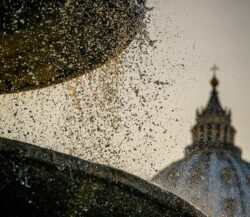
On January 8, 2022, a Swiss court rejected a request by Italian financier Raffaele Mincione to unblock assets frozen by Swiss authorities a year ago in response to a request from Vatican prosecutors, estimated at roughly $70 million.
Newsroom (09/11/2021 6:51 PM Gaudium Press) Some time ago, Italian financier Raffaele Mincione had claimed the sequestration of the aforementioned multimillionaire amount was rendering him unable to pay off business debts and provide for personal expenses for himself and his family. He also argued that the sequestration was illegitimate because prosecutors have denied him due process of law by failing to turn over key evidence.
The last time someone placed such an issue before a foreign court was in the UK. A judge unfroze assets belonging to another Italian wheeler and dealer, Gianluigi Torzi, who was also involved in the London debacle. In that case, the judge accused Vatican prosecutors of “appalling misrepresentations” in its legal filings and gave Torzi his money back.
Technically, the Swiss ruling wasn’t exactly an endorsement of the Vatican prosecutors’ indictment of Mincione. The court determined that since it has no way of knowing how many other assets Mincione may have at his disposal, it couldn’t determine the actual harm he’s suffering.
Nonetheless, three other related findings brought cheer to the Vatican prosecutorial team.
First, Mincione’s lawyers had argued that the assets ought to be unfrozen because his defence team in the Vatican Case has sought to have access to four controversial papal rescripts at the beginning of the process granting prosecutors broad powers. Still, those requests have been denied, suggesting a failure in discovery.
However, the Swiss court ruled that Mincione failed to prove that the papal documents were being “deliberately kept hidden.” The ruling suggests that disputes over which documents Mincione’s lawyers have a right to see are simply part of the usual legal wrangling in a case like this, not necessarily evidence of an effort to thwart his rights.
Second, Mincione’s lawyers cited that his defence team has not been able to access the full versions of recordings of interrogations, including the star witness in the case, Italian Monsignor Alberto Perlasca, as an illustration of defects in the system.
The Swiss court rejected that argument too. They said that the Vatican’s criminal procedure is based on that of Italy, similar to the Swiss system; it provides guarantees that the defence will have access to all materials relevant to its case. Implicitly, the court suggested that difficulties in getting certain materials so far could be due to a failure of due diligence on the part of Mincione’s lawyers.
Finally, Mincione’s team argued that the Vatican prosecution is illegitimate because there’s no separation of powers: the Pope is both the supreme executive and the supreme judicial authority. Therefore, a fair trial is impossible. That argument, too, was set aside: according to the judges, it can only be invoked by someone who’s actually in the foreign state in question and seeking the assistance of Swiss legal authorities.
Mincione is not a resident of the Vatican City State; and the court said that his request for relief “borders on recklessness, and this dilatory way of acting cannot find protection.”
None of this amounts to a finding that Mincione is guilty of the crimes he’s charged: defrauding the Vatican of millions of euros by misrepresenting the details of the London deal. Nonetheless, it is the first time a foreign court has examined the case and found the conduct of the prosecutors to date to be perfectly within internationally accepted legal standards.
Compiled by Raju Hasmukh via Crux Now